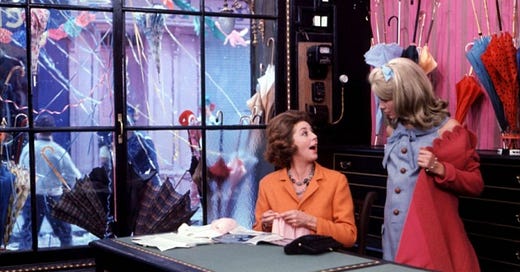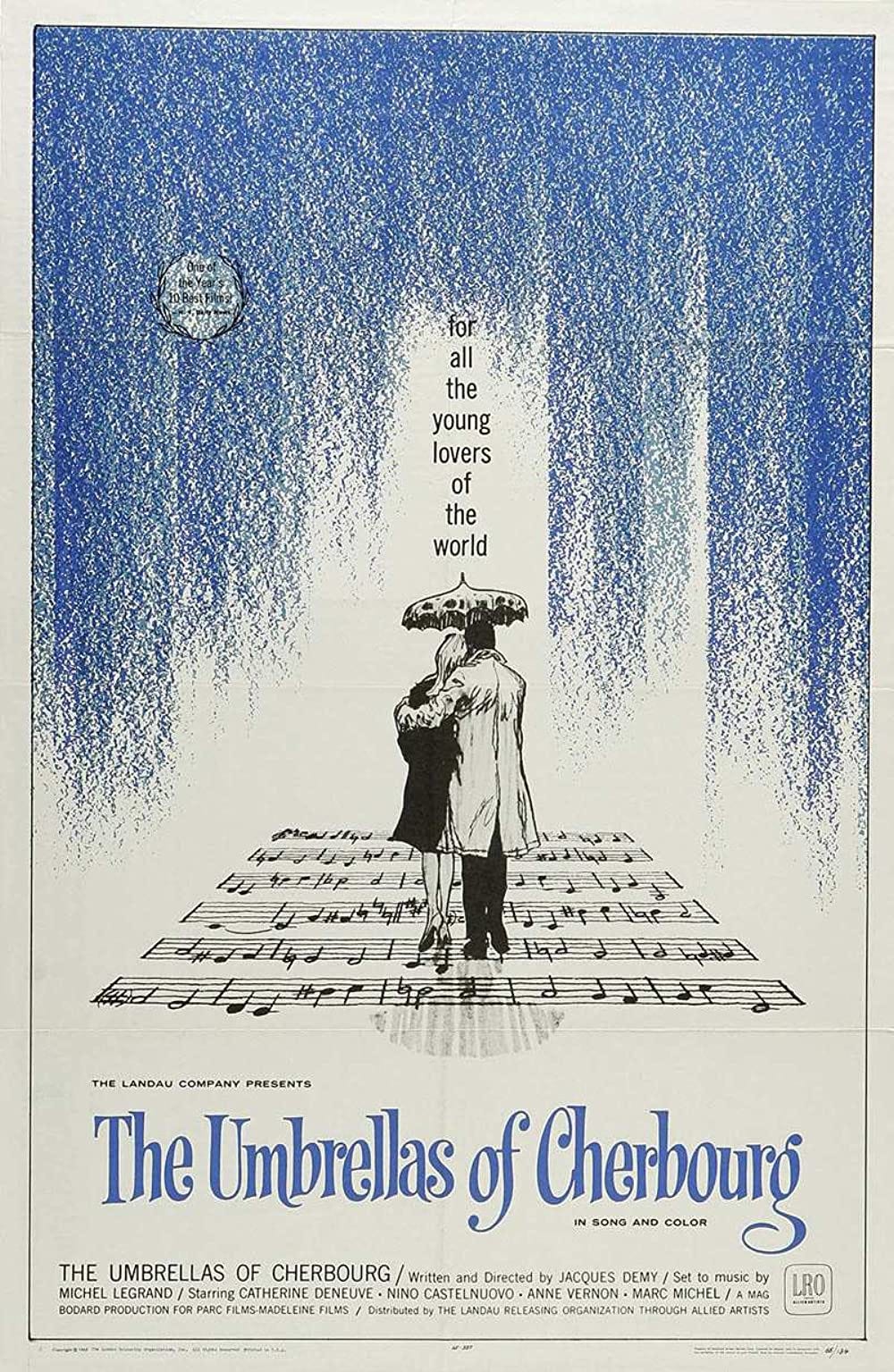A Character in The Umbrellas of Cherbourg (1964) Set Off One of My Film Allergies
Note: Today’s newsletter contains spoilers about The Umbrellas of Cherbourg, which I simply could not avoid if I wanted to discuss this film. If you have not seen this 58-year-old film by now, perhaps you don’t care about such spoilers, but you have officially been warned.
Daylight Savings happens tomorrow night, and pollen is starting to dust our cars and sidewalks all throughout the South. So, in today’s newsletter, I’d like to talk about allergies.
But not the kinds of allergies that make you sneeze or itch. I mean film allergies! The kinds of things you see in a film that don’t bother most people and shouldn’t bother you, but like those people with that gene that makes cilantro taste like soap, you can’t help but be put off by them. We all have them, and they’re often very unpopular opinions, which can be an exhausting thing to defend.
One film allergy I hear a lot has to do with bad people. I’ve heard so many folks talk about how they couldn’t get into a movie or a show or even a sports team because they couldn’t stand the main character, or they hated the entire cast.1 I think villains and reprehensible characters can be compelling if they’re well drawn and intriguing in their badness, but I understand why people would choose not to watch a thing that makes them angry.
I’m not here to talk about bad characters, though. I’m here to talk about foolish characters. And the mother in The Umbrellas of Cherbourg, though not exactly a deplorable person, frustrated me with her foolishness—to the point where I was almost rooting against her.
“But Jeremy, that character is intentionally polarizing,” you might be saying. “Her inescapable influence guides her daughter to choose security and comfort from a man she doesn’t love over the youthful though uncertain passion of her romantic counterpart, inviting the viewer to consider what factors they believe are most important in a marriage!” Yes, reader, that is true. But I’d like to discuss something far more silly and trivial.
Let me first rewind a bit. If you have not seen the film, it is focused on Madame Emery and her 17-year-old daughter, Geneviève, who has recently fallen in love with a 20-year-old gas station attendant named Guy. Madame Emery and Geneviève run an umbrella store in Cherbourg, France, which is madame’s first mistake. Cherbourg is a town of roughly 80,000 people at the time. That is far too small a population to think you’re going to be successful selling umbrellas, a thing that most people buy only once until their current umbrella breaks.2
(“But Jeremy, the central metaphor of the film is the umbrella!” you might be saying. “It represents the protection and security that comes with a financially prosperous marriage! The film spells it out pretty plainly, in fact!” Yes, reader, you are correct again. But we don’t do metaphors in this newsletter. Get outta here with that.)
That’s not even what set off my allergy to fools, though. As the film progresses, we find out that Madame Emery cannot afford to keep her shop open (quelle surprise!) and she must do something drastic in order to pay rent. So she decides to sell some of her jewelry—a pearl necklace, specifically.
Here’s where I started sneezing—metaphorically speaking. (Sorry, I won’t metaphor again!) Madame Emery and Geneviève go to a jeweler to try and sell the necklace, which he declines. However, a young jewel peddler named Roland offers to buy it from her, saying that he can have the money to her tomorrow. But instead of arranging a meeting and taking the necklace with her…she leaves the necklace with him. Ma’am. You just met this man. He is a stranger. Not only could he be a swindler, you probably deserve to get swindled for your negligence!
The next day, Madame Emery and Geneviève spend most of the day fretting about whether or not Roland will show up and pay them. He does, eventually, because he realizes that an even bigger score is on the line: Geneviève’s hand in marriage. Which Madame Emery is yet again very willing to turn over to this man, and even more so when Geneviève realizes she’s pregnant with Guy’s baby.
I won’t speak on the third act of the film, which I find to be very strong. I think this is a really lovely and well-made film overall, even though it absolutely revels in another film allergy of mine, which is operetta-style musicals where every single word of dialogue is sung.3 Let’s just say I hope that Geneviève didn’t inherit her mother’s recklessness.
The Umbrellas of Cherbourg is available on HBO Max, the Criterion Channel, and Kanopy, and it’s available to rent elsewhere.
Walter White seems like the best modern example. I loved his descent into villainy, but I’ve talked to lots of people who eventually gave up on Breaking Bad because they hated Walter more and more each season. And, to be fair, he becomes a pretty terrible human being. But that was just part of the journey for me.
Growing up, there was a store in my hometown that sold vacuum cleaners. That’s all, just vacuum cleaners. I always thought that was so niche and silly, even in a suburb that belongs to a metro area of over a million people. Anyway, that store went out of business.
I think Demi Adejuyigbe, a great comedian/philanthropist who is one of Letterboxd’s main characters, shares this particular allergy with me.





